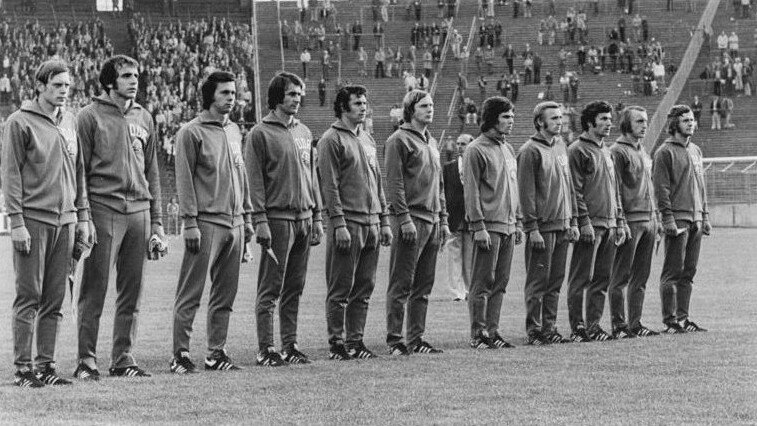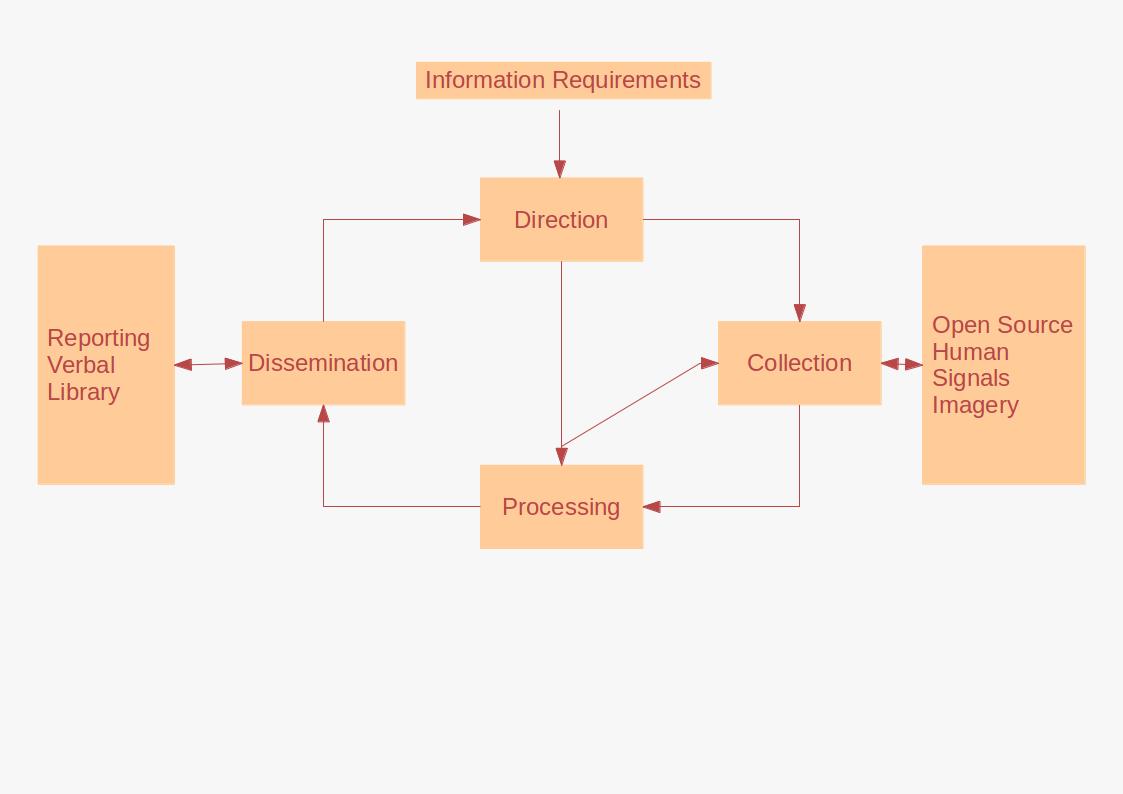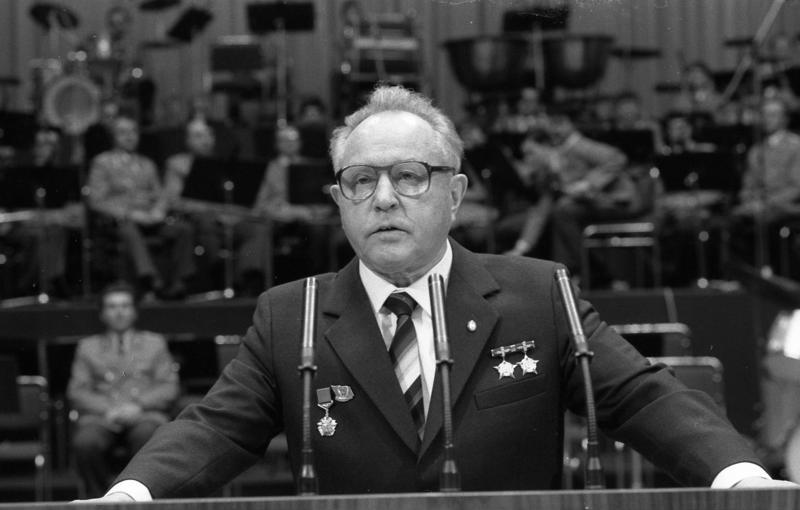|
Werner Teske
Werner Teske (24 April 1942 – 26 June 1981) was an East German (Captain) of the Ministry for State Security (Stasi). Teske was a senior intelligence officer in the Stasi's economic espionage division when he was accused of plotting to defect to West Germany with sensitive information and embezzled money. In the one-day trial, Teske was found guilty of espionage and desertion. He was sentenced to death and subsequently executed in June 1981. Teske's sentence was posthumously overturned after German reunification when it was deemed unlawful by standards of East German law, and two jurists from his trial were prosecuted. The execution was the last time a death sentence was carried out in East Germany, before its abolishment in 1987, making Teske the last person executed in Germany. Early life and career Werner Teske was born on 24 April 1942 in Berlin, and went to school from 1948 to 1960 in Berlin-Lichtenberg, graduating with the . During this time, he also played hand ... [...More Info...] [...Related Items...] OR: [Wikipedia] [Google] [Baidu] |
Berlin
Berlin ( , ) is the capital and largest city of Germany by both area and population. Its 3.7 million inhabitants make it the European Union's most populous city, according to population within city limits. One of Germany's sixteen constituent states, Berlin is surrounded by the State of Brandenburg and contiguous with Potsdam, Brandenburg's capital. Berlin's urban area, which has a population of around 4.5 million, is the second most populous urban area in Germany after the Ruhr. The Berlin-Brandenburg capital region has around 6.2 million inhabitants and is Germany's third-largest metropolitan region after the Rhine-Ruhr and Rhine-Main regions. Berlin straddles the banks of the Spree, which flows into the Havel (a tributary of the Elbe) in the western borough of Spandau. Among the city's main topographical features are the many lakes in the western and southeastern boroughs formed by the Spree, Havel and Dahme, the largest of which is Lake Müggelsee. Due to its l ... [...More Info...] [...Related Items...] OR: [Wikipedia] [Google] [Baidu] |
Handball
Handball (also known as team handball, European handball or Olympic handball) is a team sport in which two teams of seven players each (six outcourt players and a goalkeeper) pass a ball using their hands with the aim of throwing it into the goal of the other team. A standard match consists of two periods of 30 minutes, and the team that scores more goals wins. Modern handball is played on a court of , with a goal in the middle of each end. The goals are surrounded by a zone where only the defending goalkeeper is allowed; goals must be scored by throwing the ball from outside the zone or while "diving" into it. The sport is usually played indoors, but outdoor variants exist in the forms of field handball, Czech handball (which were more common in the past) and beach handball. The game is fast and high-scoring: professional teams now typically score between 20 and 35 goals each, though lower scores were not uncommon until a few decades ago. Body contact is permitted for the def ... [...More Info...] [...Related Items...] OR: [Wikipedia] [Google] [Baidu] |
Deutsche Mark
The Deutsche Mark (; English: ''German mark''), abbreviated "DM" or "D-Mark" (), was the official currency of West Germany from 1948 until 1990 and later the unified Germany from 1990 until the adoption of the euro in 2002. In English, it was typically called the "Deutschmark" (). One Deutsche Mark was divided into 100 pfennigs. It was first issued under Allied occupation in 1948 to replace the Reichsmark and served as the Federal Republic of Germany's official currency from its founding the following year. On 31 December 1998, the Council of the European Union fixed the irrevocable exchange rate, effective 1 January 1999, for German mark to euros as DM 1.95583 = €1. In 1999, the Deutsche Mark was replaced by the euro; its coins and banknotes remained in circulation, defined in terms of euros, until the introduction of euro notes and coins on 1 January 2002. The Deutsche Mark ceased to be legal tender immediately upon the introduction of the euro—in contrast to the o ... [...More Info...] [...Related Items...] OR: [Wikipedia] [Google] [Baidu] |
Defection
In politics, a defector is a person who gives up allegiance to one state in exchange for allegiance to another, changing sides in a way which is considered illegitimate by the first state. More broadly, defection involves abandoning a person, cause, or doctrine to which one is bound by some tie, as of allegiance or duty. This term is also applied, often pejoratively, to anyone who switches loyalty to another religion, sports team, political party, or other rival faction. In that sense, the defector is often considered a traitor by their original side. International politics The physical act of defection is usually in a manner which violates the laws of the nation or political entity from which the person is seeking to depart. By contrast, mere changes in citizenship, or working with allied militia, usually do not violate any law(s). For example, in the 1950s, East Germans were increasingly prohibited from traveling to the western Federal Republic of Germany where they were au ... [...More Info...] [...Related Items...] OR: [Wikipedia] [Google] [Baidu] |
Innsbruck
Innsbruck (; bar, Innschbruck, label=Bavarian language, Austro-Bavarian ) is the capital of Tyrol (state), Tyrol and the List of cities and towns in Austria, fifth-largest city in Austria. On the Inn (river), River Inn, at its junction with the Wipptal, Wipp Valley, which provides access to the Brenner Pass to the south, it had a population of 132,493 in 2018. In the broad valley between high mountains, the so-called North Chain in the Karwendel Alps (Hafelekarspitze, ) to the north and Patscherkofel () and Serles () to the south, Innsbruck is an internationally renowned winter sports centre; it hosted the 1964 Winter Olympics, 1964 and 1976 Winter Olympics as well as the 1984 Winter Paralympics, 1984 and 1988 Winter Paralympics. It also hosted the first 2012 Winter Youth Olympics, Winter Youth Olympics in 2012. The name means "bridge over the Inn". History Antiquity The earliest traces suggest initial inhabitation in the early Stone Age. Surviving Ancient Rome, pre-Roman pla ... [...More Info...] [...Related Items...] OR: [Wikipedia] [Google] [Baidu] |
1976 Winter Olympics
The 1976 Winter Olympics, officially known as the XII Olympic Winter Games (german: XII. Olympische Winterspiele, french: XIIes Jeux olympiques d'hiver) and commonly known as Innsbruck 1976 ( bar, Innschbruck 1976, label=Austro-Bavarian), was a winter multi-sport event celebrated in Innsbruck, Austria, from February 4 to 15, 1976. The Games were awarded to Innsbruck after Denver, the original host city, withdrew in 1972. This was the second time the Tyrolean capital had hosted the Winter Olympics, having first done so in 1964. Host selection The cities of Denver, Colorado, United States; Sion, Switzerland; Tampere, Finland; and Vancouver (with most events near Mount Garibaldi), British Columbia, Canada, made bids for the Games. The host was decided at the 69th IOC meeting in Amsterdam, Netherlands, on May 12, 1970. In a statewide referendum on 7 November 1972, Colorado voters rejected funding for the games, and for the first time a city awarded the Games rejected them. Den ... [...More Info...] [...Related Items...] OR: [Wikipedia] [Google] [Baidu] |
1974 FIFA World Cup
The 1974 FIFA World Cup was the tenth FIFA World Cup, a quadrennial football tournament for men's senior national teams, and was played in West Germany (and West Berlin) between 13 June and 7 July. The tournament marked the first time that the current trophy, the FIFA World Cup Trophy, created by the Italian sculptor Silvio Gazzaniga, was awarded. The previous trophy, the Jules Rimet Trophy, had been won for the third time by Brazil in 1970 and awarded permanently to the Brazilians. This was the first out of three World Cups to feature two rounds of group stages. West Germany won the title, beating the Netherlands 2–1 in the final at the Olympiastadion in Munich. This was the second victory for West Germany, who had also won in 1954. Australia, East Germany, Haiti and Zaire made their first appearances at the final stage, with the latter two making their only appearance, and East Germany making their only appearance before Germany was reunified in 1990. Host selection Wes ... [...More Info...] [...Related Items...] OR: [Wikipedia] [Google] [Baidu] |
East Germany National Football Team
The East Germany national football team, recognized as Germany DR by FIFA, was from 1952 to 1990 the football team of East Germany, playing as one of three post-war German teams, along with Saarland and West Germany. After German reunification in 1990, the Deutscher Fußball Verband der DDR (DFV, ), and with it the East German team, joined the ''Deutscher Fußball Bund'' (DFB) and the West Germany national football team that had just won the World Cup. History In 1949, before East Germany (GDR) was founded and while regular private clubs were still banned under Soviet occupation, efforts were made to play football anyway. Helmut Schön coached selections of Saxony and the Soviet occupation zone before moving to the West. On 6 February 1951, the GDR applied for FIFA membership, which was protested against by the German Football Association, which was already a full member. FIFA accepted the GDR association (later called DFV) on 6 October 1951 as a provisional member, and on 24 J ... [...More Info...] [...Related Items...] OR: [Wikipedia] [Google] [Baidu] |
Foreign Intelligence
Intelligence assessment, or simply intel, is the development of behavior forecasts or recommended courses of action to the leadership of an organisation, based on wide ranges of available overt and covert information (intelligence). Assessments develop in response to leadership declaration requirements to inform decision-making. Assessment may be executed on behalf of a government, state, military or company, commercial organisation with ranges of information sources available to each. An intelligence assessment reviews available information and previous assessments for relevance and currency. Where there requires additional information, the Intelligence analysis, analyst may direct some collection. Intelligence studies is the academic field concerning intelligence assessment, especially relating to international relations and military science. Process Intelligence assessment is based on a customer requirement or need, which may be a standing requirement or tailored to a spec ... [...More Info...] [...Related Items...] OR: [Wikipedia] [Google] [Baidu] |
Hauptverwaltung Aufklärung
The Main Directorate for Reconnaissance (german: ; german: , ) was the foreign intelligence service of the Ministry of State Security (''Stasi''), the main security agency of the German Democratic Republic (East Germany), from 1955 to 1990. The HVA was an integral part of the Stasi, responsible for operations outside of East Germany such as espionage, active measures, foreign intelligence gathering, and counterintelligence against NATO-aligned countries and their intelligence agencies. The Stasi was disbanded in January 1990 and the HVA's mode of operation was revealed to the public, including its internal structure, methods, and employees. The HVA became the subject of broad interest and intensive research under the responsibilities of the Federal Commissioner for the Stasi Records. The HVA is regarded by some as the most effective foreign intelligence service during the Cold War and the second largest after Soviet Union's intelligence forces. It provided up to 80 percent o ... [...More Info...] [...Related Items...] OR: [Wikipedia] [Google] [Baidu] |
Unofficial Collaborator
An unofficial collaborator or IM (; both from German ''inoffizieller Mitarbeiter''), or euphemistically informal collaborator (''informeller Mitarbeiter''), was an informant in the German Democratic Republic, German Democratic Republic (East Germany) who delivered private information to the Stasi, Ministry for State Security (MfS / Stasi). At the end of the East German government, there was a network of around 189,000 informants, working at every level of society.Ilko-Sascha Kowalczuk: ''Stasi konkret. Überwachung und Repression in der DDR.'' Beck, München 2013, History Before 1968 the term "Secret Informer" (''"Geheimer Informator"'') was used. The network of secret informers, commonly known in German sources by the initials IM, was one of the most important instruments of repression and also one of the most critical pillars of power supporting the One-party state, one Socialist Unity Party of Germany, party dictatorship that ran East Germany, the country. The terms "Informal ... [...More Info...] [...Related Items...] OR: [Wikipedia] [Google] [Baidu] |








